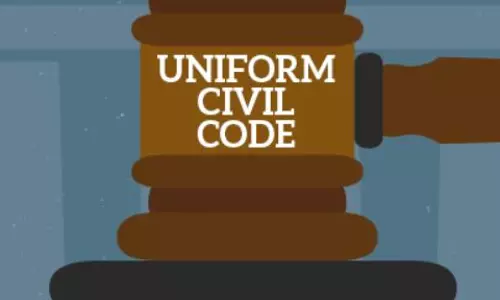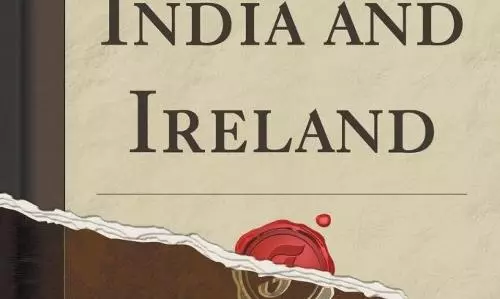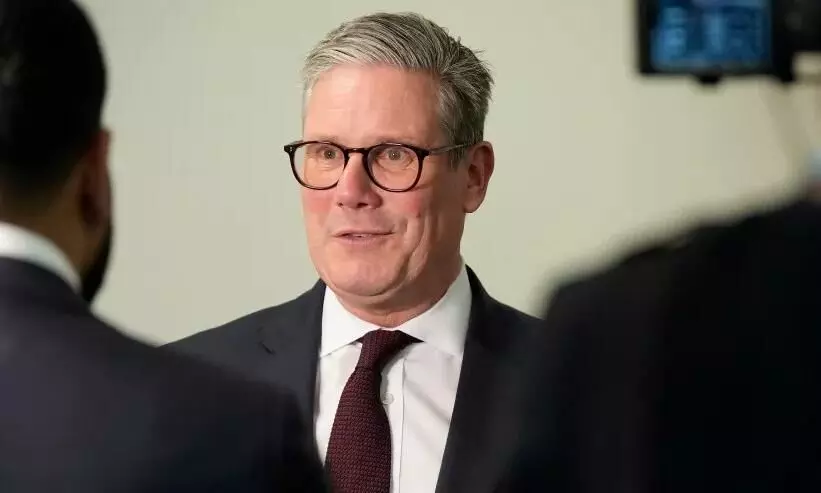
Challenges confronting the British Labour government
text_fieldsOn 5 July Keir Starmer was appointed prime minister by His Britannic Majesty. Starmer has appointed cabinet ministers from his own Labour Party. These are the first Labour ministers to hold office at the UK level since 2010. Of the 23 cabinet ministers only 3 previously served in the cabinet in the Blair-Brown years.
The 62-year-old Starmer has numerous difficulties to contend with. The waiting lists to see doctors are very long but were coming down when the Conservatives were kicked out of office. Much of this is a hangover from COVID.
Doctors, nurses and healthcare professionals are dissatisfied with their salaries. They say in real terms salaries have fallen and fallen since the credit crunch of 2008. They demand a 35% pay rise. Labour says that is unaffordable. If the government grants a pay rise of even 25%, it will cause inflation and trigger demands from other sectors for massive pay rises.
Civil servants, teachers, railway workers and many other public sector workers say they need major pay rises. Labour says there is no money. Labour also pledged not to increase most taxes. Notice the word ‘most’. There are some taxes that they refuse to rule out, such as increasing taxes.
The Chancellor of the Exchequer (Finance Minister) Rachel Reeves says that the fiscal situation is much worse than Labour was led to expect. She is getting her excuses in early and blaming the Conservatives as much as possible.
Labour promised very little in the election. They did not wish to be accused of over-promising and under-delivering. The lack of specificity was an advantage. But it also explained the lack of enthusiasm for Labour and its low poll of 34%.
The British Army has only 75,000 soldiers. That is lower than in the 18th century when the UK population was a tenth of what it is now. Recruitment and retention are both problematic. Some British soldiers leave to join the Australian Army where salaries are 50% higher.
The United Kingdom recruits 590 Gurkha soldiers from Nepal each year. The obvious thing to do is to increase this. A UK salary is very enticing for most Nepalis.
The Houses of Parliament are in a parlous condition. They are almost structurally unsound. Successive governments have known this since 2009. But governments have dithered. Spending billions of GBP on renovating the buildings is seen as politically unacceptable.
But the longer it is delayed, the worse the condition of the buildings and the higher the cost of rectification. The cheapest solution is to do the whole complex over two years. Parliament could move to another building or another city at that time.
Another possibility is to do the House of Commons first and move the MPs into the House of Lords while the members House of Lords move to another building for a few years. Once the House of Commons is renovated, the MPs can move back in and once the House of Lords building is renovated the Lords can come back.
There has been speculation that Parliament uses the Queen Elizabeth Conference Centre down the street from Parliament. But should Parliament move to another city for a couple of years? Birmingham is a clear candidate because it is the second biggest city in the UK and a 90-minute train journey from London. York has been touted as a possibility. This is a lovely small city with a large conference centre and a 2-hour train journey from London.
Governments continue to tarry. If this restructuring of the buildings is postponed indefinitely, the buildings will collapse. But no one has the political will to do the necessary but unpopular thing. It will be presented as politicians splurging money on themselves rather than spending on public services.
24 % of British adults are registered disabled. Some of them are genuinely disabled. But people are registered as disabled for the mildest things such as having a strange personality or slight learning difficulty. Nine million British adults are economically inactive. They claim welfare payments from the government. Some say they are too depressed to work. Slobbing around the house makes people feel down. Labour does not want to tackle this. Labour is the party of social parasites. People who are ‘on the sick’ are Labour’s payroll vote.
The public sector grew under the Conservatives. That is despite the Conservatives vowing to put fat government on a diet. Public sector workers are usually anti-conservative. The Conservatives say that the public service is inefficient. Labour will increase the public sector because it believes in the big state, and it recognises that public sector workers will vote Labour.
The United Kingdom is a greying society. People are living longer. Providing nursing home care for people is growing ever more expensive. Paying state pensions is a heavier burden than ever. 55% of young people go to university. That means they do not enter the workforce until the age of 21 at least.
People in the UK do not have to pay university fees upfront. They graduate and pay back over the next 40 years. The government estimates most of this shall never be repaid. University fees for home undergraduates are capped at GBP 9400. That is not enough to cover a university’s cost of educating people in most subjects but increasing the fees would be deeply unpopular.
House prices are sky-high. 50 years ago it took someone on minimum wage 8 years salary to afford a 4 bedroom Victorian house. That same house would now cost 200 years' salary!
Labour is pledged to make it far easier to get permission to build housing. However, this will cause objections from homeowners who see the value of their homes plummet due to new housing developments. Further, it means building on the flood plains and environmentally sensitive land. This will make some people turn against Labour.
Labour is releasing many criminals after only 40% of their sentences. This is due to prisons being 99% full. Prisoners used to be let out after 50% of their sentences. Releasing people early will lead to more crime. Shoplifting has been virtually legalised. The police say do not tell us if the item costs less than GBP 200. Labour plans to build 6 more penitentiaries.
One of the few areas where prospects are bright is the economy. Unemployment is 4%. Inflation is a healthy 2%. The economy is growing albeit only at 0.5% but economists say it will speed up in 2025. The United Kingdom is making steady progress with renewable energy. 25% is renewable already and that is due to increase at least 2% points per annum for the foreseeable future. Moreover, renewable energy infrastructure is becoming cheaper.
Labour has banned new oil and gas drilling. This is raising the cost of energy. But it has burnished Labour’s ecological halo. Labour is fearful of the Greens.
All the problems require money. Taxes are the highest since the 1960s.
Labour says it will grow the economy and thus be able to afford more spending without raising taxes. It looks like the economy will grow. But will it grow enough to generate sufficient revenue to tackle the UK’s manifold problems?
There is severe indiscipline in schools. The curricula are changed almost every year. There is a recruitment crisis in teaching. It is one of the few white-collar jobs that people cannot do from home.
The trade agreement with the European Union expires in 2025. Labour has to renegotiate that. The EU might demand money from the United Kingdom or that it allows EU workers to be allowed to work in the UK without a visa.
Labour is Europhile but it has ruled out seeking to rejoin the EU. The EU might not let the United Kingdom back in. It would be considered politically, though not legally, necessary to have a referendum to mandate the UK to rejoin. But the terms of entry might be unfavourable. There would be a lot of time and political capital expended on a referendum. It would be a huge distraction. The United Kingdom only left the EU in 2020. Most people are bored silly with the EU issue.
The Green Party outflanks Labour on the left. The Liberal Democrats are now a formidable force in Parliament. They have 72 MPs. That is their most since 1923. Labour realises that the Lib Dems are a serious non-Conservative alternative to Labour.
Starmer is uncharismatic and has a low approval rating. He faces several headaches.
The United Kingdom wants Ukraine to be free. But aiding Ukraine is costly.
Labour pledged to reduce immigration both legal and illegal. It abandoned the Rwanda Plan that had deterred some illegal immigrants. Labour has no plan to halt illegal immigration. Indeed, it has sped up since Labour took office. Labour relies heavily on the votes of recent immigrants. Whenever the Conservatives spoke of limiting legal immigration the Labour Party screamed racist at them.
There is some goodwill behind Labour. Most people are thoroughly fed up with the Conservatives. People will give Labour a chance. Labour will blame the Conservatives as much as possible. Labour wants to do the difficult and unpopular things now before its approval rating falls too much. Labour is basking in a post-electoral honeymoon.
Labour believes most UK institutions are racist. It will trash British heritage and remove its statues. It will force its leftist agenda down everyone’s throats. This will be a way to appease its leftist backers when Labour cannot improve public services.
Labour might reduce the voting age to 16. Youngsters are very anti-conservative. Labour suffers from low turnout. Labour might make voting compulsory.
Labour could introduce proportional representation. This would mean Labour would have to coalesce with the Lib Dems or Greens. It might mean no Conservative Government ever again.
In 34% of the votes, Labour won 65% of the seats. Why would turkeys vote for Christmas? Some Labour people say the current electoral system works very well for Labour so stick with it.
The Starmer Administration is likely to disappoint. But it is hard to see Labour losing next time. They inflicted a very heavy defeat on the Conservatives.
The author is a political analyst from the UK. He can be watched on YouTube: George from Ireland























